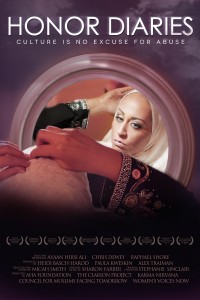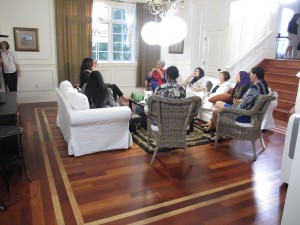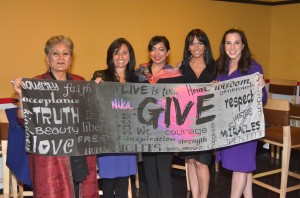In April 2011, Faleh Hassan Almaleki, an Iraqi immigrant to the United States, was sentenced to 34.5 years in prison for killing his 20 year-old daughter for becoming “too westernized.” The case was deemed an “honor killing” because the daughter, according to the dad, dishonored the whole family.
 This story is one of many presented by the film Honor Diaries, a recently launched film project directed by Micah Smith, and produced by Paula Kweskin, Heidi Basch-Harod and Alex Traiman. The film highlights the discussion on honor in “Muslim-majority societies” through a dialogue that takes place among nine female activists, who come from different backgrounds. The nine women talk about different issues that get linked to ideas of “honor,” including gender apartheid, forced marriages, honor killings, and female genital mutilation. The inclusion of real-life examples, in addition to facts and statistics by international organizations, has been instrumental in supporting claims about issues related to honor in Muslim societies.
This story is one of many presented by the film Honor Diaries, a recently launched film project directed by Micah Smith, and produced by Paula Kweskin, Heidi Basch-Harod and Alex Traiman. The film highlights the discussion on honor in “Muslim-majority societies” through a dialogue that takes place among nine female activists, who come from different backgrounds. The nine women talk about different issues that get linked to ideas of “honor,” including gender apartheid, forced marriages, honor killings, and female genital mutilation. The inclusion of real-life examples, in addition to facts and statistics by international organizations, has been instrumental in supporting claims about issues related to honor in Muslim societies.
The first concern I had with this film how it positions its main topic: honor in “Muslim-majority communities.” The film does not specify the components of these communities, and it also involves Muslims from communities that are not Muslim-majority, such as the United Kingdom and the United States. There were some examples brought up from those two countries, although these examples involve people who came from Muslim-majority countries, such as Iraq and Iran. So, the problem here is, are we talking about honor in Muslim communities? Or honor of those people coming from Muslim communities? In addition to that, it is really unfair to summarize all Muslim communities in three words. If the project intends to talk about Muslim communities, then I think it is important to talk about all of those communities worldwide. For example, North African countries, such as Tunisia, Morocco, and Algeria were never touched by the conversation in the film. Countries in East Asia, such as Indonesia and Malaysia, were also left out, as were examples from African countries such as Niger and Senegal, as well as communities in Eastern Europe such as Kosovo. In other words, the film touches only on specific “Muslim-majority societies,” and it isn’t clear how widely its arguments apply. Communities are not just characterized by being “Muslim” or “non-Muslim”. There are so many other factors that shape the way a community treats its members, regardless of gender; these include culture, education, economic development, and many others.
I found the choice of activists featured in the film most surprising. Most of the women who appear in the conversation are active in supporting survivors of forced marriages, “honor killings,” or those suffering violence in their communities. Some of these activists had previously experienced similar violence themselves, and decided to focus on the idea of supporting women at one point in their careers. For example, Jasvinder Sanghera is a survivor of a forced marriage, and now, through her project “Karma Nirvana,” she is helping women who are suffering the same problem. Despite the fact that her efforts helped hundreds of women who suffered honor crimes and forced marriages, Sanghera does not come from a Muslim-majority context, and she does not focus on women who particularly come from Muslim communities, so, for me, the women she focused on did not seem directly relevant to the argument presented by the film, hence making her case look out of context.
Another activist that looks problematic within the context of the film is Juliana Taimoorazy. On the project website, Taimoorazy is presented as “the founder of a non-profit organization that helps foster awareness about the plight of the Iraqi Christians.” In the film, Taimoorazy states the reason behind honor killings, for example, is religion. She says:
“As a Christian woman, we lived in Muslim countries for centuries obviously, but we did not adapt to honor killing, so I don’t think this is cultural, I think it is more religious, because we did not have that in our communities.“
Of course, other sources indicate that such crimes have indeed occurred within some Christian minority groups in Muslim-majority contexts, so Taimoorazy’s explanation appears simplistic here.
A third example is Ayaan Hirsi Ali, who was not part of the conversation among the nine women, but is considered an “expert” whose opinion was sought in the project. According to the film’s website, Ayaan Hirsi Ali is “an outspoken defender of women’s rights in Islamic societies,” who “escaped an arranged marriage by immigrating to the Netherlands,” and later “worked on furthering the integration of non-Western immigrants into Dutch society and defending the rights of women in Dutch Muslim society.” But it is well known, through her previous articles and books, what Islam is for her, and how women are affected by this religion, in her opinion. As an earlier MMW piece points out, while Hirsi Ali’s personal experiences shouldn’t be discounted, her practice of attributing her experiences to Islam and Muslims as a whole doesn’t leave room for other Muslim women to have different stories. At the end of the day, not all women in Muslim communities experience things in the same way (whether compared to women from their own communities or women from other Muslim communities), because of the existence of other factors, as I previously explained.
I spoke to Paula Kweskin, the producer of Honor Diaries, about the choice of those women in particular. She notes,
“there were no exact criteria for choosing those women; the whole thing came up at the wake of the Arab Spring, which was a time during which a lot of women were speaking about political and social issues. So I was attending lots of conferences, reading lots of blogs and tweets in order to look for prominent women in their fields. The only real criteria we had is that the women we chose has to be already out there as activists.”
Honor Diaries furnishes many stories of women’s experiences, which are sometimes confusing as you try to remember which is which, something that might diminish viewers’ abilities to sympathize with those characters. In significant ways, this creates a problem, because in films that tackle human living experiences, the viewer needs to connect with victims and their stories, so they won’t become just a headline in news.

When certain concepts are discussed, they tend to lack balance in their presentation. For example, the film talks about female genital mutilation, a practice that is neither advocated in Islam nor appears in Quran, but has been adopted by some Muslim societies, as mentioned in the film by Qanta Ahmed. Later on, the film presents a Muslim preacher, Sheikh Yussuf Al Badri, from Al Azhar Islamic University in Cairo, saying: “circumcision is the reason why Muslim women are virtuous, unlike Western women who run after their sexual appetite in any place with any man.” When considering this example, I just wonder why filmmakers have chosen to play up the views of this scholar rather than the anti-circumcision views advocated by the film (and, indeed, by many Muslim activists working within affected communities). For me, it gives the impression that “Islam” supports such actions, rather than acknowledging the many Muslim communities and individuals that don’t practice it or that advocate against it.
While some of the women argued that Islam has nothing to do with honor killing or female genital mutilation, some of them clearly blamed Islam for oppressing women. On one occasion, for example, Manda Zand Ervin, founder and president of “Alliance of Iranian Women”, wonders: “why is everybody afraid to say that Muslim women are deprived of their humanity?” I believe bringing up this type of argument offsets the supposed balance that was intended within the film, and creates suspicions about the possible hidden agendas of some of the participants.

Tracking the narrative of the film from the beginning to the end makes me feel something is missing in the middle. At the outset of the film, we see examples of oppressed women, and suddenly at towards the end, we come across other examples of women who defeated that oppression and stood next to men in everything. But we never know through the film how that problem was addressed, and how those women became so highly empowered.
The film was shown recently at the Chicago International Film Festival, and received a lot of positive reviews. The most interesting of them, according to Kweskin, was the fact that lots of people did not know this is happening to women somewhere in the world. Honor Diaries was also shown in the St. Louis International Film Festival, and it received the Interfaith Award for Best Documentary.
I think there needs to be a continuous discussion of honor and treatment of women in Muslim communities, because such dialogue is always healthy and necessary in shedding light on problems these women face. But on the other hand, we have to be careful in discussing women’s rights and religion in ways that do more harm than good. For people who are not familiar with those communities, the most evident factor to blame will be obviously religion; we need to look at the role of religion, but there are many other elements that should be considered as well. When it comes to religion, the different interpretations of it within these societies could be one factor. Other factors include economic development, social atmosphere, and culture.
I also would have preferred to see examples of survivors these activists have dealt with. I would have loved to know stories of Muslim women telling the audience what they went through, and how such activism helped them get out of their difficult lives. I believe it would have been a better choice compared to showing examples from media that will confuse the viewers.
Finally, many of these women are doing important work in supporting other women suffering problems in their communities, such as honor crimes or forced marriages. But people coordinating collective projects, such as this film, will have to be careful in how to frame these women’s efforts. Otherwise, these efforts will be put in the wrong context. That is why I think solving the issue of violence against women requires us to consider not only religion, but other factors as well that contribute to women’s upbringing, education, and advancement in life.











